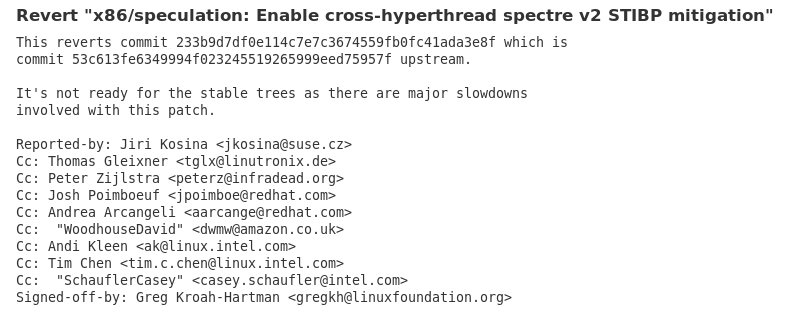Linux 4.20 has shown major performance issues and the reason behind this regression was Single Thread Indirect Branch Predictors (STIBP), as shared by Phoronix yesterday. This support is being reverted from the upcoming releases Linux 4.19.4 and 4.14.83 kernel points.
Linus Torvalds, the creator of Linux kernel, was also surprised with the performance hit on Linux 4.20 as a result of STIBP introduction. He posted to the kernel mailing list that the performance impact was not communicated before the patches were merged and believes that this should not be enabled by default:
“This was marked for stable, and honestly, nowhere in the discussion did I see any mention of just *how* bad the performance impact of this was.
When performance goes down by 50% on some loads, people need to start asking themselves whether it was worth it. It’s apparently better to just disable SMT entirely, which is what security-conscious people do anyway.
So why do that STIBP slow-down by default when the people who *really* care already disabled SMT?
I think we should use the same logic as for L1TF: we default to something that doesn’t kill performance. Warn once about it, and let the crazy people say “I’d rather take a 50% performance hit than worry about a theoretical issue”.“
The tests done by Michael Larabel also revealed that Linux 4.20 is facing significant performance issues in many workloads, more than some of the earlier Spectre and Meltdown mitigations. This has measurably affected PHP, Python, Java, and many other workloads and even the gaming performance to some extent.
The STIBP support for cross-hyperthread Spectre V2 mitigation was backported to the Linux 4.14 and 4.19 LTS series, which is now being reverted. You can find the reverts in Greg Kroah-Hartman’s linux-stable-rc tree: 
On current Linux 4.20 Git, STIBP still remains in place and a better approach to handle performance issues is being reviewed. Michael Larabel expects that the new patch series will be ready for merging prior to the shipping of Linux 4.20, which is approximately one month’s time.
To know more, check out Michael Larabel’s post on Phoronix: Linux Stable Updates Are Dropping The Performance-Pounding STIBP.
Read Next
Red Hat releases Red Hat Enterprise Linux 8 beta; deprecates Btrfs filesystem










![How to create sales analysis app in Qlik Sense using DAR method [Tutorial] Financial and Technical Data Analysis Graph Showing Search Findings](https://hub.packtpub.com/wp-content/uploads/2018/08/iStock-877278574-218x150.jpg)